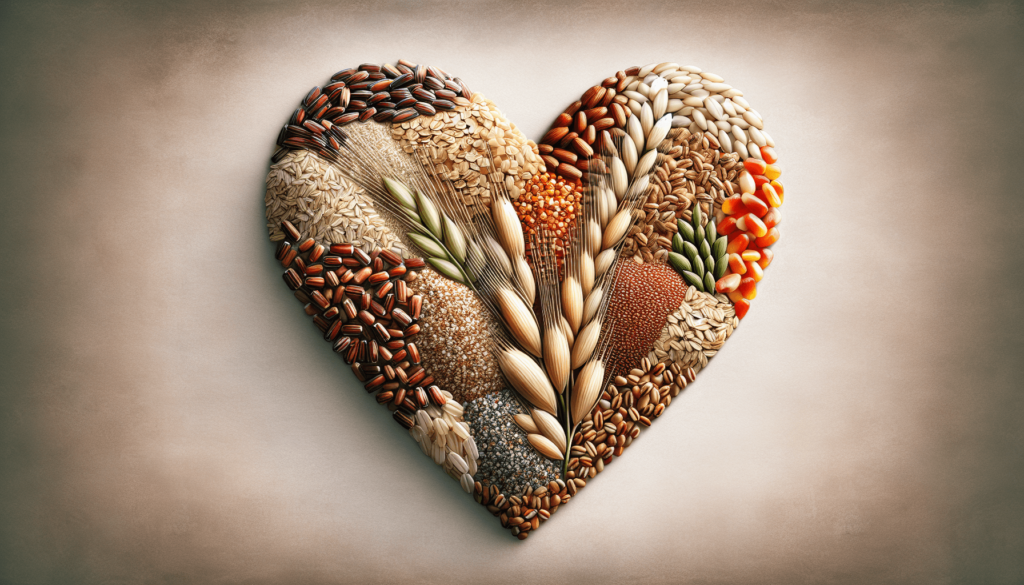In today’s fast-paced world, it’s essential to prioritize our health, especially when it comes to our hearts. When it comes to maintaining a healthy heart, it’s no secret that a nutritious diet plays a significant role. Amongst the plethora of food options, whole grains have emerged as a star in promoting heart health. Packed with essential nutrients and fiber, whole grains have been found to reduce the risk of heart disease and improve overall cardiovascular health. In this article, we will explore the fascinating connection between whole grains and heart health, providing you with valuable insights and tips on incorporating more whole grains into your diet. So, tighten your seatbelts and get ready to embark on a journey towards a healthier heart!

What are whole grains?
Defining whole grains
Whole grains refer to grains that contain all parts of the grain kernel, including the bran, germ, and endosperm. These grains have not been refined, meaning they have not been stripped of their nutrient-rich components during the milling process. As a result, whole grains retain higher levels of fiber, vitamins, minerals, and antioxidants compared to their refined counterparts.
Types of whole grains
There are various types of whole grains available, each offering a unique flavor and texture. Some common examples include:
- Brown rice: This whole grain is rich in fiber and nutrients and offers a nutty taste.
- Quinoa: Known as a pseudo-grain, quinoa is an excellent source of protein and minerals.
- Oats: These versatile whole grains can be consumed in various forms, such as rolled oats or steel-cut oats.
- Whole wheat: This grain is often used in bread and pasta and provides high amounts of fiber and minerals.
- Barley: With a chewy texture and nutty flavor, barley is a great addition to soups, stews, and salads.
- Buckwheat: Despite its name, buckwheat is not related to wheat and is gluten-free. It is commonly used in soba noodles and pancakes.
Including a variety of whole grains in your diet ensures a diverse range of nutrients and flavors.
Health benefits of whole grains
Reduced risk of heart disease
Incorporating whole grains into your diet can significantly reduce the risk of heart disease. The fiber present in whole grains helps lower cholesterol levels, which is a key factor in preventing heart-related complications. Studies have shown that consuming three servings of whole grains per day can lower the risk of developing heart disease by up to 25%.
Lowered blood pressure
High blood pressure is a major risk factor for heart disease. Whole grains, particularly those rich in magnesium, have been found to lower blood pressure levels. Magnesium helps relax blood vessels, improving blood flow and reducing the strain on the heart.
Improved cholesterol levels
Whole grains contain soluble fibers, such as beta-glucan, which are effective in reducing levels of LDL (bad) cholesterol. By incorporating whole grains into your diet, you can improve your cholesterol profile and reduce the risk of plaque buildup in the arteries.
Weight management
Including whole grains in your meals can also aid in weight management. Whole grains have a higher satiety factor, which means they keep you feeling full for longer periods. This can prevent overeating and help maintain a healthy weight, subsequently reducing the risk of heart disease.
Whole grains and heart health
The role of whole grains in preventing heart disease
Whole grains play a crucial role in preventing heart disease by improving various risk factors associated with the condition. The combination of fiber, antioxidants, and other beneficial compounds in whole grains works synergistically to enhance heart health.
Effect on risk factors for heart disease
Consuming whole grains has been linked to the reduction of multiple risk factors for heart disease. These include lower blood pressure, improved blood sugar control, reduced inflammation, and decreased body weight. By addressing and improving these risk factors, whole grains contribute to overall heart health.
Fiber and heart health
Fiber is a significant component of whole grains that plays a key role in maintaining heart health. The soluble fiber found in whole grains helps lower cholesterol levels, while the insoluble fiber promotes regular bowel movements and aids in weight management. By maintaining healthy cholesterol levels and a healthy weight, the risk of heart disease can be significantly reduced.
Other beneficial components in whole grains
Aside from fiber, whole grains contain various beneficial compounds that contribute to heart health. These include antioxidants, vitamins (such as vitamin E and B vitamins), minerals (such as magnesium and potassium), and phytochemicals. These components work together to protect against oxidative stress, reduce inflammation, and promote overall cardiovascular well-being.
Whole grains vs. refined grains
Differences in processing
One of the main differences between whole grains and refined grains lies in their processing. Whole grains retain all parts of the grain kernel, while refined grains have had the bran and germ removed during processing. This removal of the nutrient-rich components results in a loss of fiber, vitamins, minerals, and antioxidants.
Impacts on heart health
The consumption of refined grains has been associated with an increased risk of heart disease. The lack of fiber, coupled with the higher glycemic index of refined grains, can lead to elevated blood sugar levels and insulin resistance. This can contribute to the development of diabetes and heart disease. Choosing whole grains over refined grains can help mitigate these risks and promote better heart health.

How to incorporate whole grains into your diet
Choosing whole grain products
Incorporating whole grains into your diet can be as simple as swapping refined grain products for their whole grain counterparts. When grocery shopping, look for labels that explicitly state “100% whole grain” or “whole wheat” to ensure the product is made with whole grains. Start by replacing refined white bread with whole grain bread, white rice with brown rice, and regular pasta with whole wheat pasta. Gradually explore other whole grain options, such as quinoa, barley, and oats, to diversify your meals and reap the health benefits.
Tips for cooking with whole grains
Cooking with whole grains can be enjoyable and adds a new dimension to your meals. Here are a few tips to make the most of whole grains:
- Experiment with different cooking methods: Explore steaming, boiling, baking, or sautéing whole grains to find the method that enhances their flavor and texture.
- Add whole grains to salads and soups: Incorporate cooked whole grains like quinoa, barley, or brown rice into your favorite salads and soups for added texture and nutrition.
- Mix whole grains with other ingredients: Combine cooked whole grains with vegetables, lean proteins, and herbs to create delicious and wholesome grain bowls or stir-fry dishes.
- Try new whole grain recipes: Look for recipes that specifically call for whole grains and experiment with diverse flavors and cuisines.
By incorporating whole grains into your cooking routine, you can elevate the nutritional value of your meals and enhance your heart health.
Research supporting the connection
Scientific studies on whole grains and heart health
Numerous scientific studies have explored the connection between whole grains and heart health, consistently highlighting the benefits of including these grains in a balanced diet. These studies have examined various populations and have shown that higher whole grain consumption is associated with a decreased risk of heart disease and heart-related complications.
Findings and conclusions
The collective findings of these studies support the notion that whole grains have a positive impact on heart health. Regular consumption of whole grains has been shown to reduce the risk of heart disease, lower cholesterol levels, control blood pressure, and aid in weight management. These benefits make whole grains a valuable dietary component for heart health promotion.
Recommended daily intake of whole grains
National health guidelines
National health guidelines provide recommendations regarding the daily intake of whole grains. For example, the United States Dietary Guidelines advise consuming at least three servings of whole grains per day. Similarly, the American Heart Association suggests aiming for six servings of grains, with at least half coming from whole grain sources.
Serving size recommendations
The recommended serving size for whole grains varies depending on the specific grain. As a general guideline, one serving is equivalent to around ½ cup of cooked grains, such as rice or quinoa. It is crucial to portion whole grains appropriately to ensure a balanced diet and maximize the benefits for heart health.
Potential challenges and considerations
Food allergies and sensitivities
While whole grains are generally considered nutritious and beneficial for heart health, individuals with allergies or sensitivities to certain grains may need to be cautious. Common allergies include wheat allergies or gluten sensitivities, which can make consuming whole wheat or gluten-containing grains problematic. In such cases, alternative whole grains such as quinoa, amaranth, or gluten-free oats can be incorporated into the diet.
Gluten-free alternatives
For individuals who must follow a gluten-free diet due to celiac disease or gluten intolerance, there is a wide range of gluten-free whole grain options available. These alternatives include quinoa, brown rice, buckwheat, millet, and sorghum, among others. It is vital to read food labels carefully to ensure that the gluten-free products are made with uncontaminated whole grains.
Balancing whole grains with other nutrients
Although whole grains are essential for heart health, it is crucial to maintain a balanced diet by incorporating other nutrient-rich foods. Remember to include lean proteins, fruits, vegetables, and healthy fats in your meals to create a well-rounded and nourishing diet. Moderation and variety are key to maintaining overall heart health.
Whole grain misconceptions debunked
Myths and facts about whole grains and heart health
There are several misconceptions surrounding whole grains and their impact on heart health. Let’s debunk some of the common myths:
-
Myth: Whole grains are high in carbohydrates and should be avoided for weight management. Fact: While whole grains do contain carbohydrates, they are complex carbohydrates that provide essential energy and nutrients. When consumed in moderation, whole grains can support weight management and overall health.
-
Myth: All grains labeled as “multi-grain” are whole grains. Fact: The term “multi-grain” simply indicates the presence of multiple grains but does not guarantee that they are whole grains. Always check for labels specifying “100% whole grain” or “whole wheat” to ensure the product is made with whole grains.
-
Myth: Whole grains are difficult to digest. Fact: While some individuals may experience digestive discomfort with certain whole grains, most people can tolerate whole grains well. Gradually introducing whole grains into your diet and consuming them in appropriate serving sizes can help with digestion.
-
Myth: Refined grains fortified with nutrients are just as healthy as whole grains. Fact: Fortifying refined grains with nutrients does not restore the full nutritional profile found in whole grains. The combination of fiber, antioxidants, vitamins, and minerals found naturally in whole grains provides unique health benefits that fortified refined grains cannot replicate.
Conclusion
The importance of whole grains for heart health
In conclusion, whole grains are a vital component of a heart-healthy diet. Their rich fiber content, along with their various other beneficial components, contributes to reducing the risk of heart disease, improving cholesterol levels, and managing blood pressure. By replacing refined grains with whole grains, you can enhance your cardiovascular well-being and enjoy the diverse flavors and nutrition that whole grains offer. Embrace the versatility and goodness of whole grains, and prioritize your heart health through wholesome and delicious meals.

